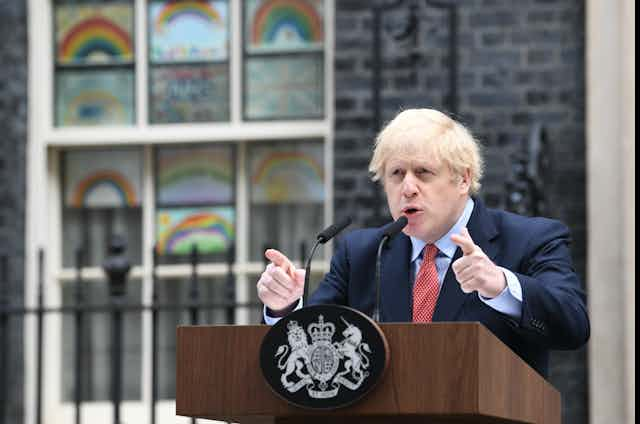As the British prime minister returns to work following his hospitalisation with COVID-19, the public will wish him well. Boris Johnson was clearly seriously ill but to judge by his statement outside No.10 on Monday morning his health has recovered. Whether there has been a change in his outlook or understanding of the difficulties facing him is much less clear.
The pre-illness Johnson exuded over-confidence. At a Downing Street press conference on March 3 he said: “I’m shaking hands continuously. I was at a hospital the other night where I think there were actually a few coronavirus patients, and I shook hands with everybody, you’ll be pleased to know. I continue to shake hands.”
Two and a half weeks later, when doubts were growing fast about the UK’s slow and confused response to the COVID-19 crisis, Johnson still felt able to declare: “I’m absolutely confident that we can send coronavirus packing in this country.” Even now the prime minister speaks of physically combatting the coronavirus as though it were an assailant.
This is the epitome of the heroic leader, going into battle bravely, even recklessly, with a belief that he is both all-powerful and invulnerable. But continuing to work while suffering from COVID-19, and downplaying his ailments, was an attitude which ultimately led Johnson to hospital, and an intensive care unit at that.
Sometimes situations call for heroic leadership, but the current predicament is not one of these. Research on leadership identifies a more relevant style, known as post-heroic leadership). This places an emphasis on inspiring through empowerment and collective action: that is, “power with” (Hannah Arendt) rather than “power over” (Max Weber).
Voters sometimes choose political leaders as a talismanic protection against apparently insurmountable problems, when we believe only superhuman powers will suffice. The cult of Johnson as charismatic hero is supported by some commentators and newspapers.
There is a difference between inspirational and charismatic leadership. The problem with charismatic leadership is that it inevitably ends in disappointment and demonisation when the leader predictably fails to live up to the followers’ unrealistic expectations. Many of those attracted to leadership roles do so from a desire to be heroic and to make a difference. These may be laudable goals but leadership styles need to be appropriate to the situation.
A different kind of problem
In the COVID-19 pandemic we are facing a “wicked problem”. Unlike a puzzle with an answer, wicked problems, like reducing poverty or drug addiction, are qualitatively different. Solutions to wicked problems are not right or wrong, but only more or less effective. And one heroic leader is not going to be able to find solutions on his or her own. As Keith Grint, professor emeritus at Warwick University, has written:
Wicked problems require the transfer of authority from individual to collective because only collective engagement can hope to address the problem … The leader’s role with a wicked problem, therefore, is to ask the right questions rather than provide the right answers, because the answers may not be self-evident and will require a collaborative process to make any kind of progress.
Solving wicked problems requires a post-heroic mindset. Heroic leadership of single-minded dogged determination inevitably fails to develop and enlist the collaborative and empowered response required for their solution at the local level. Recent research on leadership at Said Business School contrasts the heroic ego leadership of the charismatic leader with the post-heroic eco leadership practised by the most effective post-heroic leaders today.
So what should a post-heroic, practical leader returning to Number 10 do? Here are a few suggestions:
Support people in engaging with the problem and coming up with their own innovative solutions.
Listen to what others are thinking and develop hypotheses. Talk to others before deciding or acting, be open to challenge.
Work iteratively using experimentation, trial and error. Resist the temptation to think there is “an answer”. Learn from failure and disappointment rather than dismissing the experience.
Be conscious of the dangers of groupthink and group polarisation in pushing groups to take up rigid extreme positions.
Create optionality – if this does not work, what might be tried next, have a series of options before acting.
Avoid blame and criticism since negative thinking leads to pessimism and defeatism.
Perhaps we will now see more of this kind of pragmatic leadership from the prime minister, with less braggadocio, and fewer glib phrases. (“Operation Last Gasp”, anyone?). Comparing COVID-19 to a mugger during his first press conference back at work was not encouraging.
Noisy exhortation will not be enough. And however heroic NHS staff may be they cannot solve this problem. Their job is to treat the consequences not the causes. We need our leaders to have the humility to exercise post-heroic leadership rather than to fall back on the banalities of charisma.

